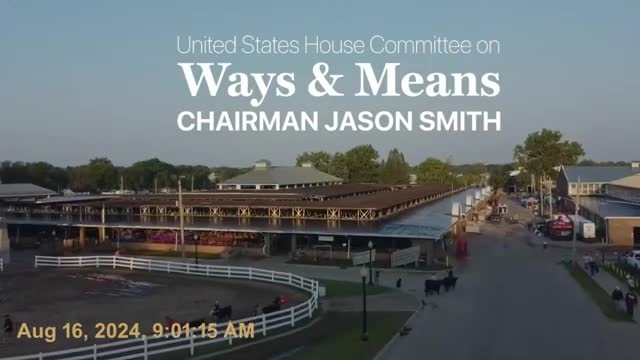House Ways and Means holds field hearing at Iowa State Fair to defend 2017 tax law
Get AI-powered insights, summaries, and transcripts
Subscribe
Summary
The House Ways and Means Committee convened a field hearing at the Iowa State Fair where members and local witnesses urged Congress to preserve provisions of the 2017 Tax Cuts and Jobs Act, warning that scheduled expirations next year would raise taxes for families, small businesses and farms.
The House Ways and Means Committee met at the Iowa State Fair to hear testimony from business owners, farmers and families on the economic effects of the 2017 Tax Cuts and Jobs Act and the consequences if key provisions expire next year. Chairman Smith opened the hearing by saying, “We are here to sit down and have a conversation with working people about the need to protect Americans from a $4,600,000,000,000 in tax hikes that will happen the end of next year.”
The hearing brought five witnesses to the dais: Karen DeWalt of Home Depot, Sarah Curry, a mother and nonprofit research director from Glenwood, Joanne Riesen of the Iowa Corn Growers Association, Steve Soukup of Soukup Manufacturing, and Lana Paul, a multi-business owner from Pella. Members of the Iowa congressional delegation and several committee members traveled to the fair to attend and question witnesses about how families and businesses used—or would lose—benefits under the 2017 law.
Why it matters: Committee members framed the hearing as a chance to gather local testimony ahead of next year’s scheduled expirations of business and family tax provisions. Witnesses described business investment, hiring and family budgets that they said relied on provisions such as the 21% corporate rate, the 20% pass-through deduction, expanded child tax credit amounts and bonus depreciation.
Witnesses reported concrete investments and tax figures tied to the law: Home Depot told members it paid $5,000,000,000 in corporate income tax in 2023 and invested billions in wages and supply-chain facilities after the law. Farmers and small-business owners described equipment purchases financed under bonus depreciation and estate- and basis-related planning to pass property across generations.
Committee members repeatedly framed the hearing as part of a nationwide effort to build support for making TCJA provisions permanent. The record of the hearing will include written statements from the witnesses, and members were given two weeks to submit additional written questions. There were no formal votes or committee actions taken at the field hearing.
The committee adjourned after the panel and questioning concluded; members said the testimony will be part of the formal hearing record as they consider legislation in Washington.
